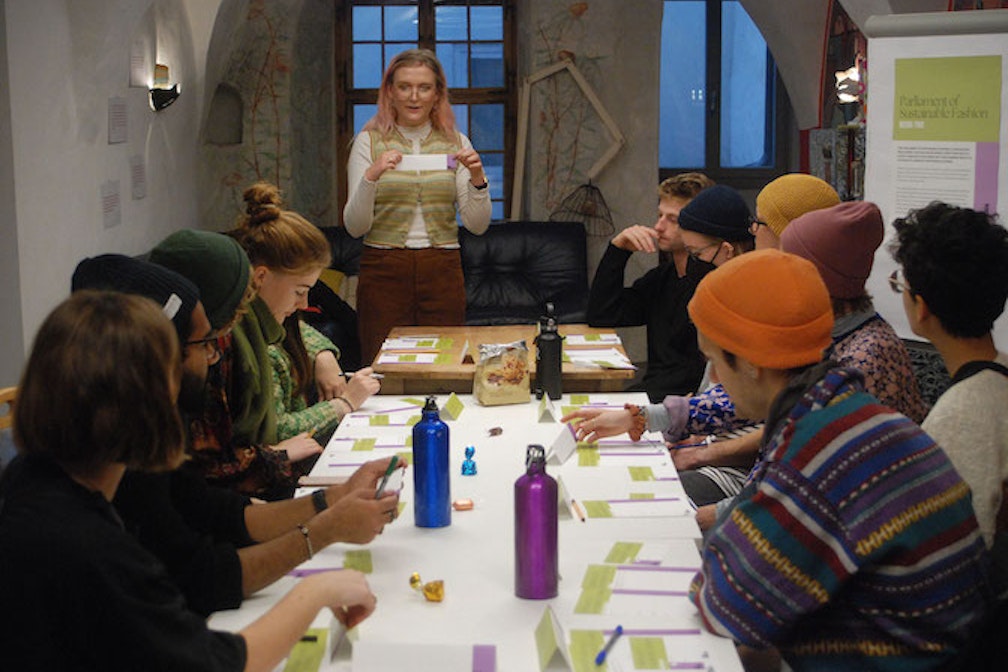Did you know there is a Parliament of Sustainable Fashion?

Ein Parlament für nachhaltige Mode? Interessant, fand ich, als ich das erste Mal im Rahmen einer Ausstellung an der Fakultät für Design und Künste der Uni Bozen darauf stieß. Viele Monate später sitze ich Mollie Edge gegenüber. Sie ist 25 Jahre alt, in Sheffield aufgewachsen und hat dieses Projekt im Rahmen ihres Masterstudienlehrgangs Eco-Social Design an der Uni Bozen entwickelt. Es ist ihre Abschlussarbeit, eben hat sie ihr Diplom gemacht. Ihren Bachelor in Textile Design schloss Mollie in Leicester ab. „Das Studium ist so angelegt“, erzählt sie, „dass man gleich danach in die Textilindustrie einsteigen kann.“ Das wollte sie aber nicht. Und so landete sie in Bozen. „Parliament of Sustainable Fashion” ist eine Plattform für Auseinandersetzung, es geht um „sharing und connecting“, auch darum, den Zugang zu Nachhaltigkeit zu demokratisieren. Mollie arbeitet vor allem mit Workshops, die Leute bringen ein Stück, von dem sie glauben, dass es nachhaltig ist, und argumentieren dort, warum. Ziel ist es, unseren Umgang mit Kleidungsstücken bewusster zu reflektieren, ein neues Verhältnis zu ihnen zu entwickeln. Und so die Modeindustrie zu verändern. Mollie, how did you come up with this idea?
Mollie, how did you come up with this idea?
My bachelor thesis was about mending. I was interviewing the mending expert Kate Sekules from New York. I asked her among other things about the people who are into mending and she said that so far it is the wealthier people, because if you are poor, you can´t wear mended clothes in the same way. So, I started thinking about making sustainable fashion more inclusive and accessible. It just went from there.
How did your interest in sustainable fashion evolve?
I did an Erasmus in Helsinki after two years in Leicester. I was about to quit my studies; nobody addressed the problems of the textile industry. In Helsinki they have this totally different mindset and I realized that I can stay in textiles and fashion and just do it in a different way. So, when I went back to Leicester for my final year I focused on sustainability. Tell us more about your parliament of sustainable fashion.
Tell us more about your parliament of sustainable fashion.
The idea is to make sustainable fashion more accessible and create a way in for a lot of people that are often excluded from the debate. We have workshops, everyone has to argue why something they own should be the leader of the parliament. And it’s not important who wins, it’s more about everyone sharing different stories. Often about family, culture, different repair techniques.
So, the main protagonists are the clothes not the people?
The idea around this is that if people have a closer relationship with their clothes maybe they will value them more and not throw them away. And through telling the stories the relationship changes and the people see their clothes in a new way.
How do people respond to your project?
In the workshops the feedback is great. Overall, the workshops are really a nice space. Different people from different social groups come together. It is really about bringing all approaches together. Important is a judgment free atmosphere. Like, Fast Fashion is not good and I don’t encourage it, but people who buy fast fashion are not bad. I am not focusing on labor issues etc., other people do this but I am not an activist, my project is about coming together. And its best on its experience. How do you dress yourself?
How do you dress yourself?
Clothes are really important to me. I only buy secondhand for many years. It also suits my style. I love wearing random prints and bright colors. And I can’t afford most eco products. I definitely have too many clothes, now that I am moving back to the UK, I realize that.
Is your generation more aware about sustainable fashion? What do you observe?
I think it’s true that the real problems arrived with fast fashion, for example the speed and the scale of things. It’s completely split. Social Media are encouraging to look new all the time. But I do think that the younger generation are much more aware and more ready to take responsibility. But it’s still about making it cool.
Your next steps?
I would like to do a PhD in Sustainable Fashion in London. There is a Research Centre with a lot of interesting research projects, for example about decolonised textiles and sustainability. That would be great for next year. In the meantime, I have my workshops booked and try to establish my connections in England.
Ein Satz, den Mollie während unseres Gesprächs gesagt hat, ist mir besonders in Erinnerung geblieben: „We need to be more compassionate.“ Auch darum geht’s. Nicht zu streng zu sein mit sich und den anderen, einander auf dem Weg zu einem besseren Modekonsum vor allem zu unterstützen als zu kritisieren. Habt ihr ein Kleidungsstück, für das ihr euch einsetzen möchtet, das vielleicht „Leader“ des Parlaments werden soll? Schaut rein auf Mollies Homepage, da gibt’s genügend Beispiele.  Hier findet ihr auch mehr über die Mending-Expertin Kate Sekules.
Hier findet ihr auch mehr über die Mending-Expertin Kate Sekules.
Fotos © Mollie Edge/Parliament of Sustainable Fashion
>> Supported by CORA happywear (M), Kauri Store (M), Oberalp Group (XL), Oscalito (L) und meiner Freundin Kristin <<
Wenn ihr diesen Blog auch unterstützen möchtet, gibt‘s hier alle Infos.